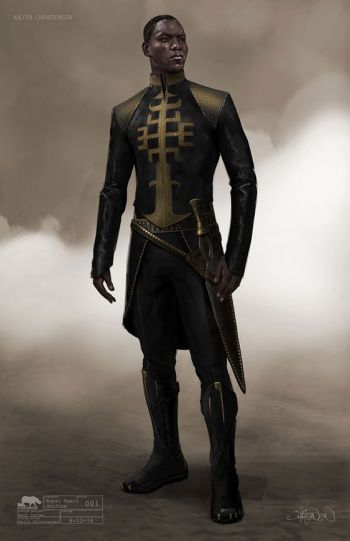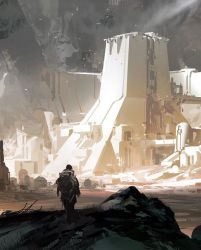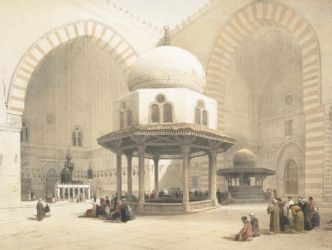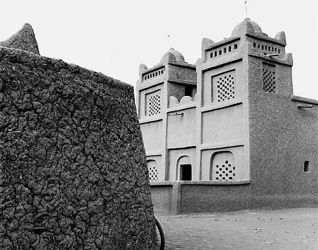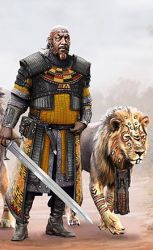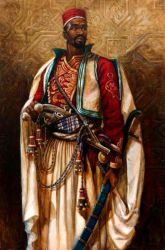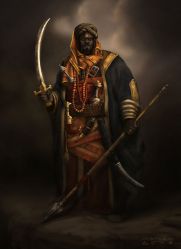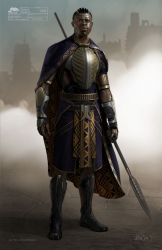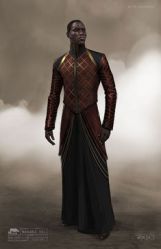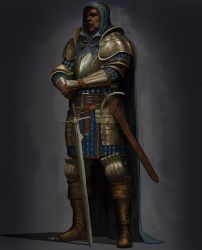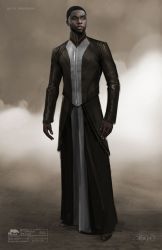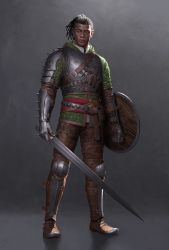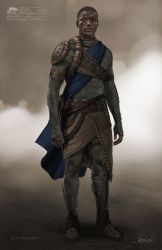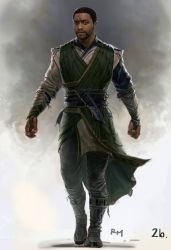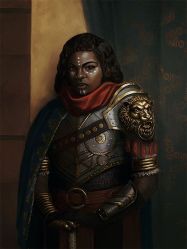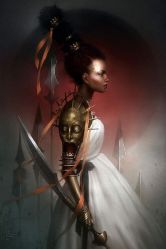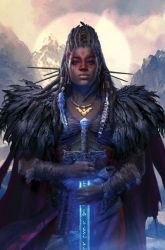Changes: Sim Layout, City-States, RPCSS Factions, and Storyline. Read More
Bheka
From The Citadel
A fantasy blend of the medieval Bantu people, Wakanda, and the Amazons, Punt and Kesh from they Hyborian Age, Shendi of Gor.
Bheka is locate in the central southern part of the Essealas continent between Arjat and Tenysia. They are on a desert pennisuala south of a vast grassland where cattle is grazed and elephants and jaguar roam wild. Bheka is a white city with tall flat-topped towers built of coral rather then stone. There is little stone in the area, so the city is built from coral mined off shore and bleached as white as beaches by the strong sun.
Bheka is the primary trade port for the local nomadic tribes who bring in cattle, maize, and ivory to trade for fish and crafted goods. The Bantu people "share" the flood plains that sit between Arjat and Bheka, the shift in fortune for control of these fertile farms dictating their access to inexpensive vegetables and grains. Bantu cooking tends to focus on grains, slow-cooked stews, curries and dairy, which are flavoured with a variety of spices and spices.
- Personality
The Bantu people of the Bheka city-state are a proud, reserved people who believe themselves to be a racially pure and advanced society. They share a lot in common with their neighbors in Arjat, though the relationship has been tumultuous at best. They are traditionalists who value loyalty to the tribe, the people and the ancestors above all. They do not approve of Tenysia, or any Bantu who travels there.
Bheka is a tribal region with hundreds of individual tribes with greater or lesser power throughout the region. Most tribes exist outside of the city walls as nomadic people and have little say in the politics of the continent. However, at least four dozen powerful and wealthy tribes live within the city walls and are forever competing for resources and influences. As of this date, the ruling tribe has been in power for the last 100 years, and war has been a continual occurrence as Bheka seeks to control every resource available in the sparse landscape. Other more peaceful tribes have tried and failed to dispose the current ruling tribe.
- Appearance
The Bantu are a dark skinned, dark eyed people with black hair. They have strong facial features and powerful athletic bodies. The current hairstyle trend is towards shorn/shaved heads or elaborate braided styles. The Bantu practice body scaring and body modification based on their individual tribal affiliation, but do not tattoo their heads, for fear that they will be confused with a Sythian.
Current clothing treads call for an elongated fashion style comprised clean lines, dark muted fabrics and limited but dramatic jewelry choices. Some tribes have refused to adopt current fashion trends and still wear loose-fitting, brightly colored fabrices and much more jewlery of a wide range of styles. The Bantu people enjoy exploring the fashion of their allied city-states, so a wide variety of styles in unexpected fabrics is to be expected.
- Traditions
The Bantu people have a creator god whom they call Nkulunkulu who was born from the reeds. He is said to have broken off medicine men and dreams, the first man and woman, the cow and bull, and then the other animals. Nkulunkulu is in everything; he is in the corn, the tree, the water. Yet Nkulunkulu does not interact with humans and has little interest in everyday life.
The Bantu people interact with the spirits of their ancestors. The spirit world is a complex place and it interacts with the natural world on a regular basis. Misfortune is believed to be the result of sorcery or offended spirits, and sacrifices are made so as to receive ancestral blessings. The Bantu view most of the other gods on the continent to be powerful ancestor gods for the other peoples, consequently, it is not uncommon for the Bantu people to participate in other religions -- especially if the wish the good will of those people.
For their burial traditions, the deceased are treated with much respect. And depending on seniority and affordability, the bodies are usually wrapped in cowhide. Once wrapped and placed in a coffin, they are buried on their dedicated burial sites which are mostly on the land that the family owns. They do not bury in municipal cemeteries, because it is thought to keep the family and ancestors together to further strengthen their connections once they need guidance in prayer. It is believed that when one dies they are “going home” to where they belong. And to make it there they need respect, dignity and a proper burial. Being cremated is out of the question and is thought of as a curse and that person can never find their way back.
- Expanded Lore
- Further reading and links for the culture obsessed.
- History
- Timeline
Small Council NPCs
| Role | Description |
|---|---|
| Nkonikoni Kosan Ruler |
He was born with this name since he was to succeed the throne after his father. His family has been in power for 100 years and he strives to keep the legacy going. His taut muscles that show his prowess. His eyes are as intense as the desert sun and his demeanor demands respect -- all fear his anger. Even though his countenance may seem stern, he remains on the path of diplomacy due to Xolani Mncedisi and takes counsel from his ancestors reminding him to not be so quick to cut anyone down who opposes his word. Though he is loved by many some think that he and his family have overstayed their place in the kings’ seat. |
| Xolani Mncedisi Diplomat |
Xolani’s ambitious father made sure that received an advanced education. She learned how to be personable, delightful, and talk with words of silk. She can convince even the most stern, and cold hearted to come to her side and see her reasoning. Not only do her words have merit, her beauty delivers them with grace. Her charm, wisdom, and wit have carried her all the way to the side of King Nkonkoni. There is even a rumor that they are a bit too close -- something she doesn’t care to confirm. |
| Genhuza Mnqobi Warlord |
Gebhuza had been trained since he was young to be a warrior from the Zwelibani tribe that lived closer to the mountains within Bheka. Once he was able, he joined the army and served it well. Over the years his credentials had made him worthy enough to be master of the brigade and keep the next generation of fighters held to the same standard as he laid out for himself. From maintaining civil peace when an uproar occured in the capital, to warding off formidable opponents outside their borders and keeping their territory safe. He was then promoted to his position as warlord and has carried the military to be as organized and effective for many years. |
| Mnotho Abdoulaye Coinmaster |
Mnotho inherited his fortune when an accident befell his brother Siza. Some would say that Mnotho is disqualified to be the coinmaster. From this time, he has thrived, living comfortably and cultivated a thriving business in cattle herding. He is known to offer fair and generous loans but has a reputation of a man who should not be crossed. |
| Mnthunzi Ingwe Spy Master |
Mthunzi has kept to himself most of his life. His introverted ways draw people to him and they are inclined to tell their secrets. It may be because of his handsome face or his silver tongue but either way he is the ear that people chose to talk to. In time he found that he could use this ability to his advantage and make money. He developed a specialized group and harnessed their ability to get the right secrets to the right ear. He can blend in easily with different tribes and neighboring states, making him the perfect candidate for the King to employ. He remains politically undecided but is exceptional in his work and does whatever is needed to keep his pockets fat. |
Phrases
- The Land of Ebony and Ivory
- A nickname for Bheka that refers to their exports of ebony and ivory, and the color contrast of the dark-skinned people and their white city.
Gallery
- We need more female images in the style of the men above. I'd like picture submissions from players who are intending to play this culture, only.
